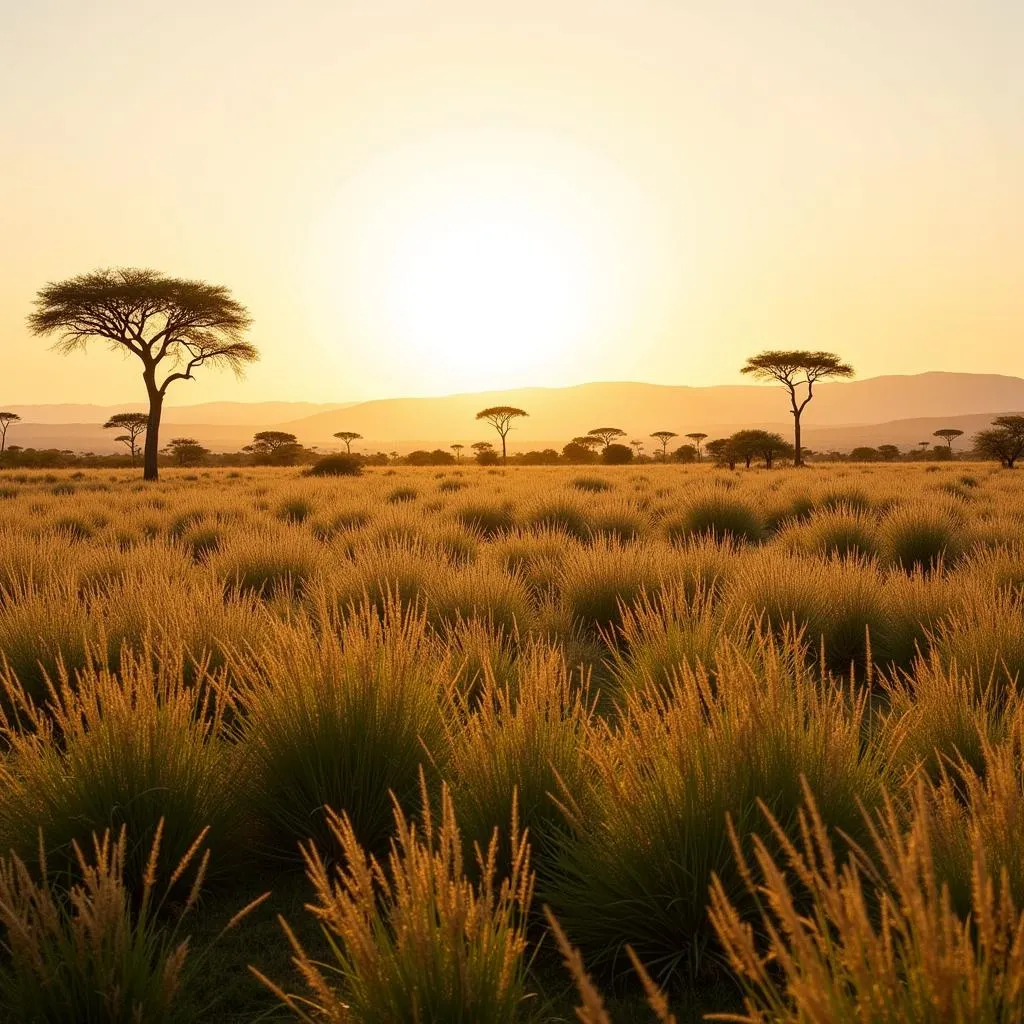The African Elephant Diet in the Wild: A Guide to What These Gentle Giants Eat
The African elephant, the largest land mammal on earth, is an herbivore with an enormous appetite. Their diet plays a critical role in shaping the African landscape and influencing the biodiversity of their ecosystem. Understanding the African Elephant Diet In The Wild provides a fascinating glimpse into the lives of these magnificent creatures.
A Diverse and Voluminous Diet
African elephants consume a wide variety of vegetation, their diet changing with the seasons and availability of food sources. They are known to eat:
- Grasses: Especially during the rainy season, grasses form a significant portion of their diet.
- Leaves: Elephants use their trunks to strip leaves from branches, favoring certain types of trees.
- Bark: The bark of trees provides essential minerals and fiber.
- Fruits: When in season, fruits like wild figs and mangoes become a delicious treat.
- Roots and Tubers: Elephants dig for these underground treasures, especially during drier periods.
How Much Do African Elephants Eat?
Their enormous size demands an equally impressive food intake. An adult African elephant can consume anywhere from 150 to 300 pounds of food per day! This requires them to spend a considerable amount of time foraging for food, sometimes up to 18 hours a day.
The Importance of Water
Water is as crucial as food for these giants. An adult elephant can drink up to 50 gallons of water daily. During the dry season, elephants use their tusks to dig for water in dry riverbeds, creating waterholes that benefit other animals.
The Impact of Their Diet on the Ecosystem
The African elephant diet in the wild plays a vital role in their ecosystem. Their feeding habits:
- Control tree populations: By eating leaves and bark, they prevent certain tree species from dominating.
- Create clearings: Their foraging activities open up areas in forests and grasslands, allowing sunlight to reach the ground and promoting the growth of different plant species.
- Disperse seeds: Many seeds pass through their digestive system undigested and are deposited in their dung, aiding in seed dispersal.
Threats to Their Food Sources
Sadly, habitat loss due to human encroachment and climate change are increasingly threatening the food sources of African elephants. As their natural habitats shrink, elephants are forced into closer proximity to humans, leading to conflicts over resources.
Conserving These Gentle Giants
Protecting the African elephant diet in the wild is crucial for their survival. Conservation efforts include:
- Habitat preservation: Establishing and protecting national parks and reserves where elephants can roam freely.
- Anti-poaching measures: Combatting illegal hunting for ivory and other elephant products.
- Community outreach: Working with local communities to reduce human-elephant conflict and promote coexistence.
Understanding the dietary needs of these magnificent creatures is essential to ensuring their continued existence. By supporting conservation efforts and promoting awareness about their plight, we can help secure a future for African elephants and the incredible biodiversity they represent.
FAQs About the African Elephant Diet
1. Are African elephants carnivores?
No, African elephants are herbivores, meaning their diet consists solely of plant matter.
2. What is an African elephant’s favorite food?
While their preferences vary, fruits like figs and mangoes are considered favorites when in season.
3. How does their diet differ from the Asian elephant?
Although both species are herbivores, there are differences in their diets. African elephants consume more browse (leaves and twigs), while Asian elephants eat more grass.
4. How do elephants find enough food each day?
Elephants have a keen sense of smell and memory, allowing them to locate food sources and remember areas with abundant resources.
5. What can I do to help protect African elephants?
You can support organizations dedicated to elephant conservation, educate others about their plight, and advocate for policies that protect their habitats.
For more fascinating facts and information about African elephants, be sure to read about the difference between Indian elephants and African elephants. You might also be interested to learn about the African forest elephant facts and some African forest elephant fun facts.
Remember, every action counts when it comes to protecting these gentle giants for future generations. If you need any assistance or have questions, please do not hesitate to contact us. You can reach us at +255768904061, email us at [email protected], or visit us at our office in Mbarali DC Mawindi, Kangaga, Tanzania. Our dedicated customer service team is available 24/7 to assist you.


